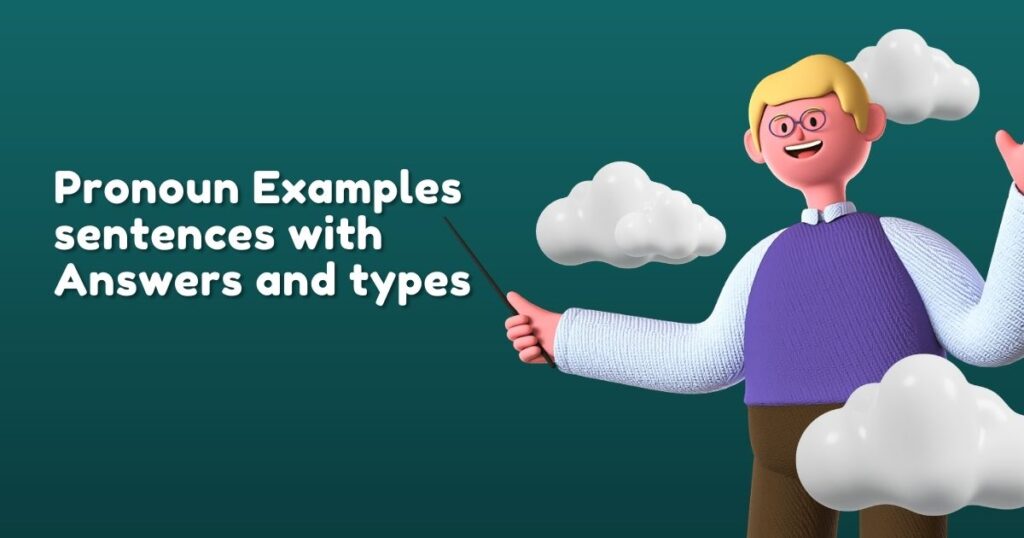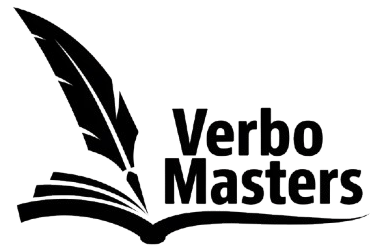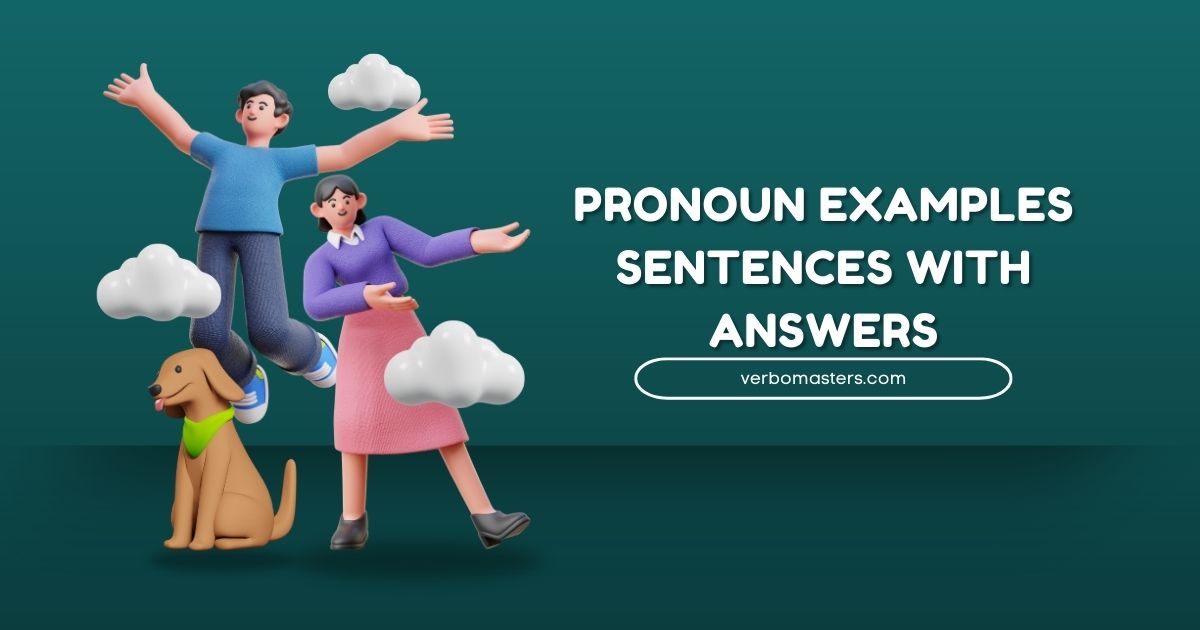Pronouns are words used to replace nouns in sentences, making communication smoother and avoiding repetition. They include words like “he,” “she,” “it,” “they,” and “we.” Using pronouns properly helps sentences sound more natural and less repetitive.
They play a key role in showing possession, pointing out something, or replacing names. In this guide, we’ll explore some easy examples of pronouns in sentences and see how they function. Understanding how pronouns work is essential for writing and speaking clearly.
You can also read; How to Introduce Yourself in English?
Pronoun Examples sentences with Answers and types

examples of sentences with pronouns used in different ways. These sentences will include subject pronouns, object pronouns, possessive pronouns, and reflexive pronouns.
Subject Pronouns
- He is going to the store.
- She is a talented artist.
- It is a beautiful day.
- They are planning a trip.
- We love to go hiking on weekends.
- I will call you later.
- He doesn’t like chocolate.
- She enjoys painting in her free time.
- They are reading books.
- We are all excited for the concert.
- I think it’s going to rain.
- It looks like he’s having fun.
- He works in a bank.
- She sings beautifully.
- They have finished their homework.
- We will meet at the park.
- I need some help with this.
- He loves to swim.
- She is studying for exams.
- We are friends.
- They are preparing for the test.
- It seems like a good idea.
- He walked to school this morning.
- She has a new pet.
- I don’t know the answer.
Object Pronouns
26. I saw her at the party.
27. He helped me with the homework.
28. I called him last night.
29. She is talking to us right now.
30. The teacher gave them a special assignment.
31. Can you hear me?
32. He gave it back to the store.
33. We will meet you tomorrow.
34. She invited me to the party.
35. I found him in the library.
36. She asked me to join her.
37. Can you pass it to me?
38. I saw them in the restaurant.
39. He told us to be quiet.
40. She loves it when people are kind.
41. Did you see him yesterday?
42. I heard her singing in the kitchen.
43. They showed me their new house.
44. She invited you to her birthday party.
45. Can you help me with this?
46. I’ve never met him before.
47. He couldn’t hear us.
48. The teacher gave us instructions.
49. She showed me her artwork.
50. I told her to wait.
Possessive Pronouns
51. This is my book.
52. That is his car.
53. Her dress is beautiful.
54. Their house is huge.
55. Our team won the match.
56. My phone is charging.
57. This is his favorite movie.
58. Her shoes are new.
59. Your room is messy.
60. I can’t find my keys.
61. Their dog is very friendly.
62. His jacket is on the chair.
63. This is our responsibility.
64. My computer is slow today.
65. Is that your pen?
66. Her hair is long and curly.
67. This is my seat.
68. His handwriting is neat.
69. We love our home.
70. Their children are in school.
71. Is this my jacket?
72. Your shoes are by the door.
73. This is his idea.
74. I like my coffee hot.
75. Is that their car parked outside?
Reflexive Pronouns
76. I taught myself how to cook.
77. She did the work herself.
78. He fixed the car himself.
79. We enjoyed ourselves at the party.
80. They completed the project themselves.
81. I can’t believe myself.
82. He did the whole thing himself.
83. She went to the store herself.
84. We will handle this ourselves.
85. The kids played themselves.
86. He is proud of himself.
87. She congratulated herself for the achievement.
88. I am proud of myself for finishing the project.
89. They took care of the garden themselves.
90. We found ourselves lost in the city.
91. I made the decision myself.
92. He entertained himself by reading a book.
93. She bought the dress herself.
94. They organized the event themselves.
95. We didn’t need any help; we did it ourselves.
96. I locked the door myself.
97. She enjoyed herself at the party.
98. They made the cake themselves.
99. I will treat myself to something special today.
100. He introduced himself to everyone.
Interrogative Pronouns
101. Who is coming to the party?
102. What is your favorite color?
103. Which one do you prefer?
104. Whose book is this?
105. What is for dinner tonight?
106. Who wants to go to the movies?
107. Which way should we go?
108. What are you doing later?
109. Who is your favorite actor?
110. Whose idea was it to go hiking?
111. Which restaurant do you recommend?
112. Who broke the vase?
113. What time does the train leave?
114. Which one is the best option?
115. Whose keys are these?
116. What kind of music do you like?
117. Who is responsible for this?
118. Which color should we choose?
119. Who called earlier?
120. What is your biggest goal?
Demonstrative Pronouns
121. This is my favorite book.
122. That is an amazing movie!
123. These are my friends.
124. Those shoes look great on you.
125. Look at this!
126. This is the best day ever.
127. That was a great performance.
128. These are the tickets for the concert.
129. I like this more than that.
130. Do you want these?
131. That was a great idea!
132. Take a look at this painting.
133. These flowers are beautiful.
134. I prefer those to these.
135. This cake is delicious.
136. Can you pass me those papers?
137. These are the shoes I bought.
138. That looks amazing!
139. These colors look great together.
140. I can’t believe this is happening.
Indefinite Pronouns
141. Everyone is invited to the party.
142. Someone is knocking at the door.
143. Nobody wants to go outside.
144. Everything is ready for the picnic.
145. Anything is possible if you try.
146. Nothing seems to be going right.
147. All are welcome to join.
148. Many have already arrived.
149. Few people showed up.
150. Some of us are tired.
151. One of the books is missing.
152. Anyone can participate in the contest.
153. Several of the students have left.
154. No one likes to fail.
155. Everything is going according to plan.
156. Anybody can see the difference.
157. Each of us is responsible for something.
158. Somebody needs to clean the kitchen.
159. Nothing can stop us now.
160. Most of the team showed up.
Relative Pronouns
161. The book that you gave me is great.
162. The person who called you is my friend.
163. The house which we bought is beautiful.
164. The movie that we watched was exciting.
165. The teacher who helped me was kind.
166. The car that he drives is new.
167. The chair which I sat on is broken.
168. The team who won the game was amazing.
169. The song that she sang was beautiful.
170. The place where we met is special to me.
171. The man who owns the store is friendly.
172. The house where I grew up is nearby.
173. The book that I lent you is my favorite.
174. The cat which you adopted is cute.
175. The dog who followed me was friendly.
176. The movie that made me cry was intense.
177. The painting which you like is on sale.
178. The person who helped me is my hero.
179. The restaurant where we ate was amazing.
180. The time when we met was unforgettable.
Possessive Pronouns (continued)
181. Is this mine?
182. That jacket is hers.
183. The phone is ours.
184. The final decision is yours.
185. The book is theirs.
186. That idea is his.
187. Mine is bigger than yours.
188. The victory was ours.
189. I think this bag is hers.
190. The painting is theirs.
191. The project is ours to complete.
192. The responsibility is yours now.
193. That pen is mine.
194. Is this his wallet?
195. The dress is hers.
196. This notebook is mine.
- The pizza is ours.
- The success is theirs.
- That idea is yours to keep.
- This photo is mine.
These examples should give you a good range of sentences that demonstrate how pronouns function in different contexts!
FAQs
What is a pronoun?
A pronoun is a word that takes the place of a noun to avoid repetition. Examples include “he,” “she,” “it,” “we,” and “they.”
Why are pronouns important in language?
Pronouns help make sentences clearer and more concise by replacing nouns, making communication easier and less repetitive.
Can you give me an example of a subject pronoun?
Sure! In the sentence “She is reading a book,” the word “she” is a subject pronoun that replaces a person’s name.
What is the difference between a subject and an object pronoun?
Subject pronouns, like “he” or “they,” act as the subject of a sentence. Object pronouns, like “him” or “them,” receive the action of the verb.
What is a possessive pronoun?
A possessive pronoun shows ownership, such as “my,” “your,” “his,” “her,” “their,” and “its.”
How do reflexive pronouns work?
Reflexive pronouns, like “myself” or “themselves,” refer back to the subject of the sentence, indicating that the subject and the object are the same.
What is a demonstrative pronoun?
Demonstrative pronouns point out specific things or people, such as “this,” “that,” “these,” and “those.”
What is an indefinite pronoun?
An indefinite pronoun refers to something non-specific, like “everyone,” “anything,” “someone,” or “nothing.”
Can I use pronouns in formal writing?
Yes, pronouns can be used in formal writing, but they should be used carefully to ensure clarity and avoid ambiguity.
How can I improve my use of pronouns?
To improve, practice identifying pronouns in sentences and try replacing nouns with pronouns to see how it makes the sentence easier to read and understand.
Conclusion
Pronouns are essential in everyday language. They help avoid repetition and make sentences flow more naturally. Words like “he,” “she,” “it,” “we,” and “they” take the place of nouns, simplifying communication. By using pronouns correctly, we can make our writing and speech more clear and concise.
In addition to being practical, pronouns also add variety to language. They help us convey possession, ask questions, and even reflect actions. Understanding how and when to use them is key to improving your grammar. So, mastering pronouns is a great way to enhance your communication skills.

I’m John Smith, a language enthusiast dedicated to helping writers, students, and professionals master the art of clear and effective communication. Whether you’re looking for grammar tips, writing guides, or common mistake corrections, you’ll find valuable insights to improve your language skills. Let’s make grammar simple and fun!

